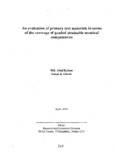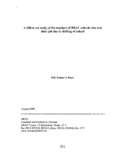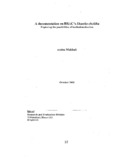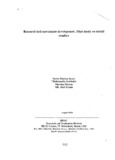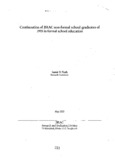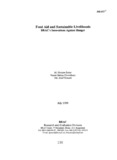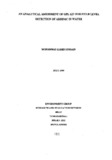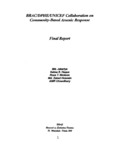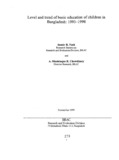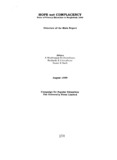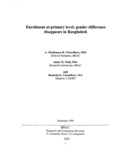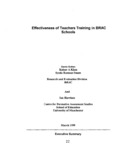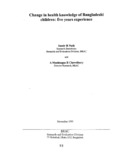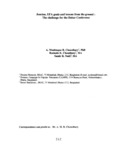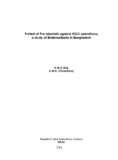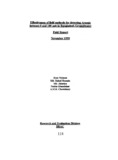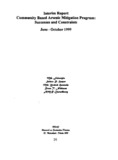BRAC: Recent submissions
Now showing items 81-100 of 939
-
An evaluation of primary text materials in terms of the coverage of graded attainable terminal competencies
(BRAC Research and Evaluation Division (RED), 2000-04)The world conference on Education for All 1990, at Jomtien, Thailand, set a new goal for the developing countries around the world to educate people of these countries with basic education. As a signatory to the declaration ... -
A follow-up study of the teachers of BRAC schools who lost their job due to shifting of school
(BRAC Research and Evaluation Division (RED), 2000-08)This study aimed at examining the changes that occur in the lives of the former teachers of BRAC schools who lost their job due to the shifting of schools after completion of the cycles. A total of 386 ex-teachers was ... -
A documentation on BRAC's Shastho shebika: exploring the possibilities of institutionalisation
(BRAC Research and Evaluation Division (RED), 2000-10)Shastho shebikas (SS) are health cadres, selected from BRAC's Village Organisations (VO). They are the nucleus of BRAC health programmes and are trained in preventative, promotive and curative aspects of health. As the ... -
Research-led curriculum development: pilot study on social studies
(BRAC Research and Evaluation Division (RED), 2000-08)BRAC's EDU has been working to develop effective materials for it's learners from early on. In phase II the focus was on providing improved materials and refining curriculum to suit the needs of the learners. In the case ... -
Research-led curriculum development: pilot study on Mathematics
(BRAC Research and Evaluation Division (RED), 2000-08)The EDU of BRAC's education program has made changes in its curriculum based on the monitoring, research and internal Survey reports which suggested that learners faced difficulty with many sections of different subject ... -
Continuation of BRAC non-formal school graduates of 1995 in formal school education
(BRAC Research and Evaluation Division (RED), 2000-05)The education programme of BRAC not only provides quality basic education to its learners it also put emphasis on their enrolment in formal schools for further education. The Research and Evaluation Division of BRAC ... -
School without a head teacher: one-teacher primary schools in Bangladesh
(BRAC Research and Evaluation Division (RED), 2000-09)Although there is no person called head teacher in BRAC's non-formal primary schools, however, the programme organisers (PO), each of whom look after 12-15 schools, playa pivotal role in the operation of BRAC schools. ... -
Food aid and sustainable livelihoods: BRAC's innovations against hunger
(BRAC Research and Evaluation Division (RED), 1999-07)The study aims to examine the situation of the poor in Bangladesh and analyse the experiences of BRAC in ensuring food security for the extreme poor through its two specially designed programmes: (a) Income Generation ... -
An analytical assessment of GPL kit for field level detection of arsenic in water
(BRAC Research and Evaluation Division (RED), 1999-07)An attempt was taken to evaluate the suitability of GPL kit for field level detection of arsenic in water. The sources of variation in results of tests for arsenic determined by GPL kit seemed to be use of different sets ... -
BRAC/DPHE/UNICEF collaboration on community-based Arsenic response
(BRAC Research and Evaluation Division (RED), 1999)The severity of the problem of arsenic in ground water in Bangladesh is now well recognized. 97% of the population relics on ground water for drinking and cooking purposes and it is estimated that half of the country may ... -
Level and trend of basic education of children in Bangladesh: 1993-1998
(BRAC Research and Evaluation Division (RED), 1999-11)Using data generated through two nationally representative sample surveys, this article explores the trends in the level of basic education of Bangladeshi children. The instrument used for the purpose was based on the ... -
HOPE not COMPLACENCY: state of primary education in Bangladesh 1999
(BRAC Research and Evaluation Division (RED), 1999-08) -
Enrollment at primary level: gender difference disappears in Bangladesh
(BRAC Research and Evaluation Division (RED), 1999-12)In the recent past, there has been a number of new initiatives to improve the access to primary education in many developing countries. Such initiatives, which came from the public, private and non-governmental (NGO) ... -
Effectiveness of teachers training in BRAC schools
(BRAC Research and Evaluation Division (RED), 1999-03)The study attempted to evaluate the newly designed training module for teachers who are teaching English in class three, four, and five of BRAC NFPE schools. With the knowledge of BRAC graduates' relative weakness in ... -
Change in health knowledge of Bangladeshi children: five years experience
(BRAC Research and Evaluation Division (RED), 1999-11)This article explores the improvement in the level of health knowledge of Bangladeshi children over a five year period 1993-1998. Data were generated from two nationally representative sample surveys covering respectively ... -
Jomtien, EFA goals and lessons from the ground : the challenge for the Dakar Conference
(BRAC Research and Evaluation Division (RED), 1999)It is now almost ten years since the last World Conference on Education for All (WCEFA), held in Jomtien, Thailand, had called for ensuring basic education to at least 80% of the children. This paper, with latest field ... -
Protest of pro-Islamists against NGO operations: a study of Brahmanbaria in Bangladesh
(BRAC Research and Evaluation Division (RED), 1999) -
Taking research to non-researchers: the case of a research compendium of BRAC
(BRAC Research and Evaluation Division (RED), 1999-11)The study assessed the readership of Nirjash, a vernacular research compendium of BRAC. Since its inception in 1995, five issues have been produced. In 1998 we conducted a readership survey on its usefulness, accessibility, ... -
Effectiveness of field methods for detecting Arsenic between 0 and 100 ppb in Bangladesh ground water
(BRAC Research and Evaluation Division (RED), 1999-11) -
Interim report community based arsenic mitigation program: successes and constraints June - October 1999
(BRAC Research and Evaluation Division (RED), 1999)The severity of the problem of arsenic in ground water in Bangladesh is now well recognized. 97% of the population relies on ground water for drinking and cooking purposes and it is estimated that one third of the country ...

